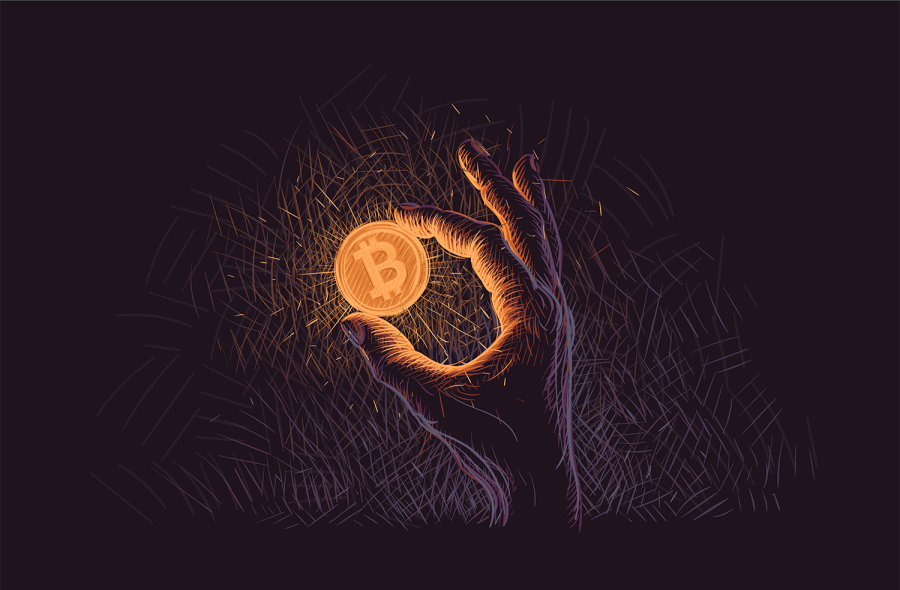Columns
Bitcoin as next generation money
Bitcoin will change the monetary system just like money replaced the barter system.
Aayur Phuyal
Today, most contemporary financial news including the budget and monetary policies around the world are debating and streamlining Bitcoin and other cryptocurrencies. Nepal too is controlling withdrawals from banks fearing that its money is going without account into cryptocurrency, giving further burdening its already reduced foreign reserves. The paradox is that, on the one hand, the government is prosecuting cryptocurrency users, and on the other, it is doing research on its possible legalisation. The use of such currency by China in some specific cities and the recent budget outline of India has given further importance to it. In the context of Nepal, we need an immediate policy on it.
Bitcoin is a cryptocurrency made using blockchain technology. First, we need to understand the blockchain technology to make sense of cryptocurrency. Money basically has three roles: (1) Medium of exchange, (2) Store of value and (3) Unit of account. Bitcoin checks all three boxes. The world is going digital and so is money. Bitcoin offers a new form of "digital money" which many leaders and nations have not been able to offer since the beginning of human civilisation. The whole world currently uses freely floating fiat currency. It has many flaws and also leads to huge financial crises including the one in 2008. Since then, a person or a group of persons going by the name of Satoshi Nakamoto pioneered blockchain technology to successfully deploy a currency known as Bitcoin. Because a lot of cryptography is used to develop the blockchain and deploy the digital currency, the term cryptocurrency is used.
Decentralised blockchain
Cryptographer David Chaum first proposed a blockchain-like protocol in 1982, which was further developed by Stuart Haber and W Scott Stornetta in the 1990s. Satoshi Nakamoto conceptualised the first decentralised blockchain in 2008 by solving various fundamental problems faced by blockchain technology, hence creating Bitcoin.
In simple terms, blockchain is an advanced digital ledger system where each ledger or block of data is connected to another ledger or block of data via a chain in the decentralised network, hence the name "blockchain". This ledger system is visible to everyone participating in the network, and any changes made to a previous ledger or block of data is visible to the public making this system more transparent. Anyone can join the decentralised network using a smartphone, laptop or any other computer which has an internet connection. This happens because these ledgers or blocks of data are not stored on a single server but are stored on a decentralised network.
In 1994, American computer scientist Nick Szabo proposed the concept of smart contracts. In 2015, with the launch of the Ethereum blockchain, smart contracts became fully functional. Instead of lawyers, smart contracts are written by programmers using computer code; and instead of the "rule of law", the "rule of code" is followed. Smart contracts enable automated transactions to happen when certain criteria is made without human intervention. Smart contracts open up new avenues for commercial relationships and an increasing range of economic activities between untrusting parties through the blockchain network.
Till now, we have learned about the advanced digital ledger system linked with each other in a decentralised network and about smart contracts, these two tools are fundamentals to blockchain. With these two tools, individuals, companies, enterprises and governments can create applications that run on the blockchain network. Applications made using the blockchain platform are called decentralised applications, or dApps in short. Ethereum, Solana, Tron and Cardano are some of the most popular blockchain platforms where one can make such dApps. All these platforms have their own native cryptocurrency which is used to pay for the services provided by the blockchain platform. A lot of people are only buying these cryptocurrencies hoping that their value will increase without knowing their actual use cases.
Currently, a lot of financial dApps are launched on different blockchain platforms, and are known as decentralised finance (DeFi). DeFi is the movement that leverages decentralised networks to transform old financial products into trustless and transparent protocols that run without intermediaries. Traditional financial systems use systems of banks and intermediaries to complete a single transaction between parties. This can take several days and comes at a cost. A decentralised financial system is one where transactions occur between one individual and another individual with no middleman. It is governed by smart contracts, and the transactions are nearly instant, almost for free and borderless. This poses a threat to the current banks. Decentralised applications (dApps) made on blockchain platforms can be used in a lot of fields. The most notable are the financial sector, payment system, supply chain logistics, health care records and many more.
Traditional banking
It is widely believed that free market brings innovations. Bitcoin, blockchain technology and dApps are all products of the free market. Since this is a newly discovered field, central banks and other central monetary regulators all over the world are having a hard time regulating it. The current freely floating fiat currency’s existence is threatened by the mere existence of Bitcoin and other cryptocurrencies. Once Parliament creates new laws and regulations regarding this new industry, traditional banking systems can be replaced by DeFi. This means central banks and other traditional financial institutes need to start researching and developing products in this new field. They have the upper hand in this free market as they can integrate the newly discovered distributive ledger technology with traditional banking to compete with the new DeFi institutes.
Traditional banking is shifting towards a more digital system. In doing this, the newly discovered distributive ledger technology and blockchain technology will play a huge role. The innovation of Bitcoin paved the way for blockchain technology to emerge in the market, which the traditional banking industry has to use. Bitcoin will bring drastic changes in the monetary system of the world just like money which replaced the barter system over a period of time. The use of cryptocurrency in place of money is the future; but in a digitally divided society, redundancy of the central bank's role in monetary policies, unexpected fluctuations in the price of cryptocurrencies and other pertinent issues need to be taken care of by a country like Nepal.




 9.7°C Kathmandu
9.7°C Kathmandu















